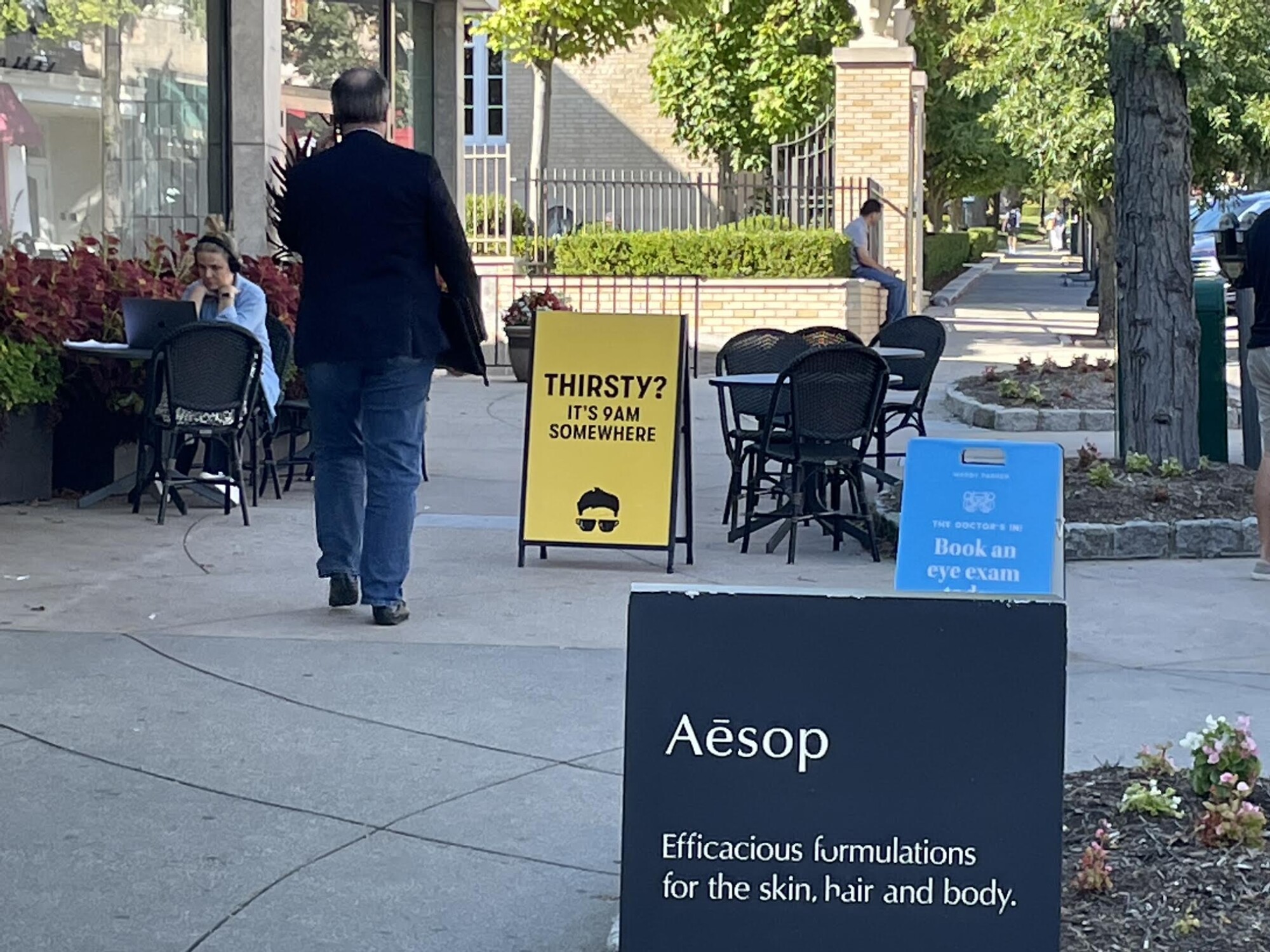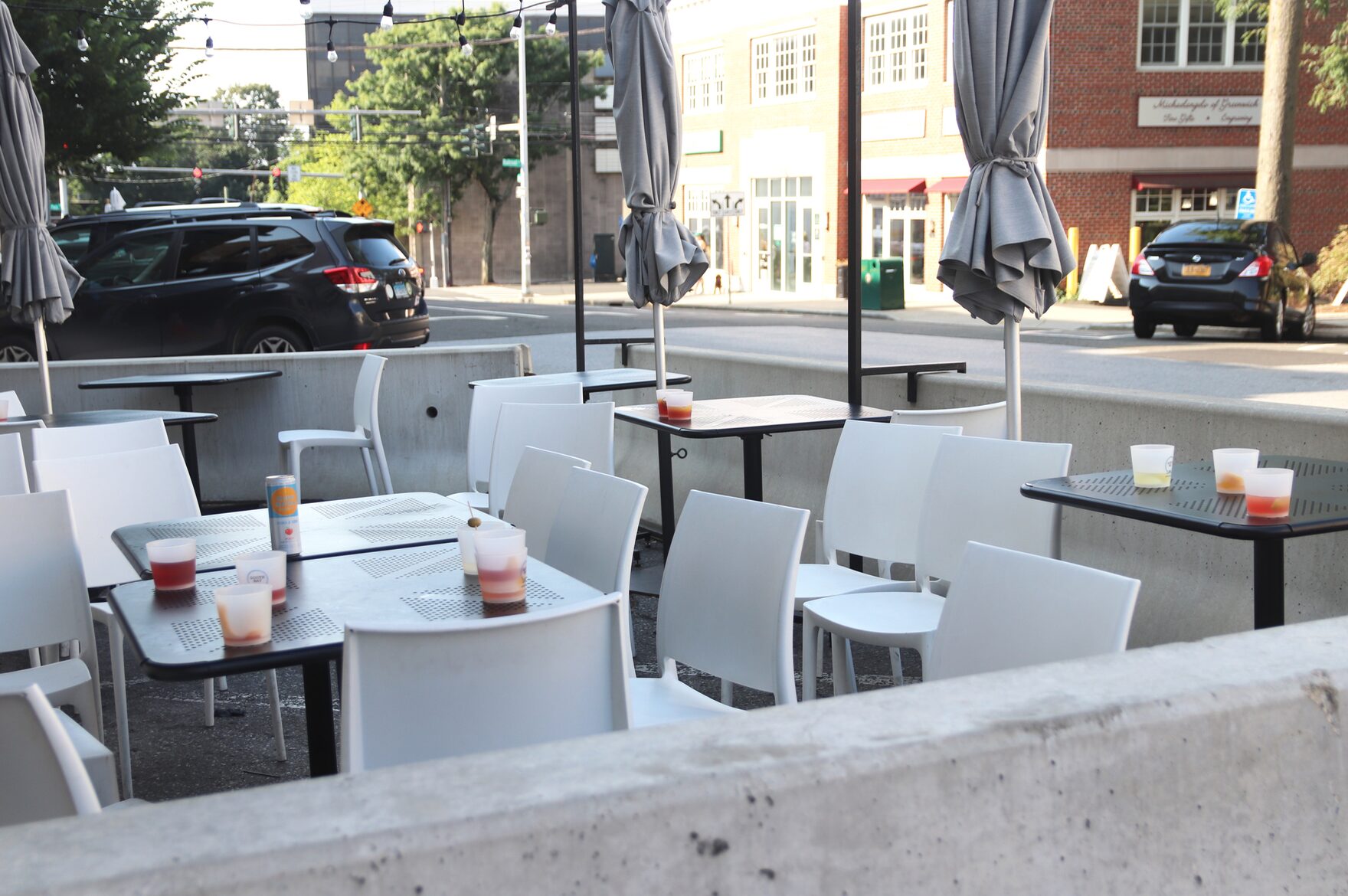On Tuesday the Board of Selectmen voted to approve the dates for 2024 outdoor dining and fees to allow public parking spaces to be used for outdoor dining that were proposed by town administrator Ben Branyan at the previous meeting on Feb 8.
The season will be shorter, ending on November 3 rather than the third week of November.
The cost to use the parking spaces was based on a fee of $36.87 per day, which reflected the revenue that would otherwise be generated by parking spots.
Selectwoman Lauren Rabin said feedback she had heard was that the season start later in April and that ADA accessibility be enforced.
Town Planner Pat LaRow said while ADA was referenced in the zoning regulations, it was in consultation with the town building official.
“It is an art, not a science, doing those things, especially given the topography of Greenwich Ave,” he said.
“We try to make sure that everyone has the ability to sit outside, but sitting in the node specifically may not be something that can be done given those circumstances,” he said. “I don’t want people to think the nodes are ADA accessible everywhere because that may not be the case depending on the circumstance.”
After Mr. LaRow referred to seating as an art, Alan Gunzburg, chair of the First Selectman’s Committee for People with Disabilities shared some strong words about the lack of ADA accessibility.
“It’s not just access into the node. It’s a table at the node that is high enough for a wheelchair to sit in. Second, the sidewalks have to be clear. Tables on the sidewalk just don’t really work. And then, the A-frames. They are everywhere! And those impede the safe transport of individuals from one end to the other – whether they’re in a wheelchair or they’re blind.”
Mr. LaRow responded to Mr. Gunzburg’s comments.
“We are not signing off on outdoor dining situations that don’t have ADA solutions to them,” LaRow said. “I agree with Mr. Gunzburg that access on the sidewalk is paramount. That is something we look at very closely – the distance to pass by. I think what he is referring to as A-frames. We try to get to those as much as we can, but they are lower priority than health and safety issues to buildings and structures…”
LaRow mentioned his department had requested an additional enforcement officer in the budget.
“We are trying to make sure we are on top of it and educating all the operators,” he said. “For those who don’t or ignore, there’s consequences. Not having a node is one. Not having outdoor dining is another. We’re not feckless in the matter but we’re trying to set this up for success, and not for failure.”

A-frame signs. File photo Sept 2022
“It is a science. It’s not an art,” Gunzburg added. “There are regulations. It’s not a loosy-goosy thing we can make up here and there. And, if you can’t get an accessible node, why should we give you one? Why have one if it’s not accessible to everybody? I’m a little disappointed by all of that.”
Downtown resident Carin Ohnell said she’d witnessed the evolution of outdoor dining over the past several years.
“I’ve commented previously about how little we charge for this privilege. It’s the most expensive real estate probably in the state of Connecticut,” she said.
“We undercharge for parking on our primary street and undercharge for the hours,” she continued, noting that in other towns similar to Greenwich with outdoor dining, the meters remain in effect beyond 5:00pm, while Greenwich does not.
She said most Greenwich restaurants had not followed the rules and the town does not have adequate enforcement capacity.
“Enforcement was minimal,” Ohnell said, adding she’d seen broken glass and a mess during regular walks.

Uncleared tables in a node on Greenwich Ave. Saturday morning, Aug 5, 2023
Ohnell suggested a fee that would go toward enforcement of rules on ADA accessibility and cleanliness.
“If we’re going to allow it, we’re going to have to find the money for enforcement. Or charge a fee – $1,000,” she suggested. “We’re giving stuff away for free. The town is getting more crowded and we have all these buildings potentially under construction.”
First Selectman Fred Camillo said there was a balance between encouraging people to come to town and not making fees cost-prohibitive for restaurants, and that the fees were based on the town not losing revenue on the meters.
“We may not be charging enough for parking itself,” he said.
Ms Ohnell said it was important to have diverse activity on Greenwich Avenue to ensure a vibrancy.
“We don’t want to only have outdoor dining on Greenwich Avenue. We want to encourage stores to come because it keeps a vibrant community where you have both dining and shopping. Right now we’re heavy on restaurants. It used to be more limited,” she said, referring to the zoning regulation about a minimum distance between establishments with liquor licenses that was struck down in 2016.
“The amount of rent they pay per foot is considerable, you have to consider that. …It’s a sacrifice for the shop next door to the restaurant,” she said.
As for extending the hours that meters meet to be fed, she noted, “At 4:00pm you’ll see the workers for the restaurants parking on Greenwich Avenue because they only have to pay for one hour.”
“You’re giving real estate at a severe discount. You’re allowing them to expand their footprint at a discount to market rate,” Ohnell added.
“There’s more positive than negative with this and I happen to be in that camp,” Camillo said.
Republican Selectwoman Lauren Rabin said she supported a possible extension of the hours the town collected meter fees beyond 5:00pm.
Democratic Selectperson Janet Stone McGuigan said next year the board should consider “going beyond just lost revenue.”
“It’s not to look at this as a revenue source but to get the economic balance right between parking, dining and other businesses on the Avenue,” she said.
Following public comment, the selectmen voted unanimously to approve the proposed fees and shortened end date of the season.
See also:
Selectmen Consider Shortening Outdoor Dining Season in 2024; ADA Accessibility & Compliance Urged